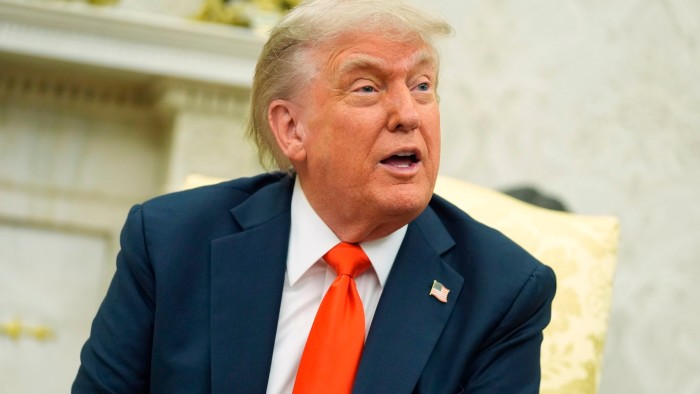Unlock the White House Watch newsletter for free
Your guide to what Trump’s second term means for Washington, business and the world
Donald Trump has attacked Elon Musk as “crazy” and threatened to rip-up his government contracts, as the spat between two of the world’s most powerful men erupted into an all-out public feud.
Speaking in the Oval Office on Thursday, the US president said he was “very disappointed” in Musk for criticising his signature tax bill, and suggested he was trying to defend his business interests.
In a follow-up post on his social media site, Trump said Musk, who is upset that the tax bill now before the Senate would increase the US deficit, had been “wearing thin” and that he had “asked him to leave” government.
The president claimed Musk opposed the “big beautiful bill” because the administration was ending policies that benefited Tesla.
“I took away his EV Mandate that forced everyone to buy Electric Cars that nobody else wanted (that he knew for months I was going to do!), and he just went CRAZY!” Trump wrote.
“The easiest way to save money in our Budget . . . is to terminate Elon’s Governmental Subsidies and Contracts,” he added, in an apparent threat to end billions of dollars’ worth of business between the US government and Musk companies including SpaceX.
The comments prompted an explosive riposte from Musk, who had thus far refrained from criticising the president directly.
The Tesla boss, who in April retreated from politics because of the “blowback” against his businesses, suggested he regretted backing Trump with more than $250mn during last year’s election.
“Without me, Trump would have lost the election, Dems would control the House and the Republicans would be 51-49 in the Senate,” he posted on his social media site X soon after the Oval Office tirade. “Such ingratitude.”
Shares in Tesla fell by almost 11 per cent following Trump’s remarks and were down 13.5 per cent on the day, sending the stock to a one-month low.
Musk, the US’s largest political donor, also suggested that Republican lawmakers should side with him over the president.
“Some food for thought as they ponder this question: Trump has 3.5 years left as President, but I will be around for 40+ years,” the billionaire wrote on X. He floated the idea of forming a new party.
He also hit back at Trump’s suggestion that he had opposed the “big beautiful bill” because it axed tax credits for electric vehicles and clean energy, which have long benefited Tesla in the US.
“Keep the EV/solar incentive cuts in the bill, even though no oil & gas subsidies are touched (very unfair!!), but ditch the MOUNTAIN of DISGUSTING PORK in the bill,” Musk posted.
The deepening row between Trump and “first buddy” Musk — who opposes the president’s trade war and tax bill — has now spread through Washington.
Last week, Trump pulled the nomination of billionaire astronaut Jared Isaacman, a close ally Musk, to lead Nasa, ostensibly over contributions he had made to Democratic candidates in the past.
Isaacman, who was on track to receive bipartisan support from the Senate, disputed the White House’s justification for the decision.
“I don’t think the timing was much of a coincidence,” Isaacman told the All-In podcast on Wednesday. “There [were] some people that had some axes to grind, I guess, and I was a good, visible target.”
Musk had already announced that he was stepping back from his involvement in the Trump administration, where he had led the so-called Department of Government Efficiency (Doge). Musk boasted that Doge would cut trillions of dollars from federal spending, although the savings so far have been much more modest.
Steve Davis, one of Musk’s lieutenants at SpaceX who led Doge on a day-to-day basis, had also now left the administration, according to a government official.
More senior figures close to the billionaire were set to abandon the initiative in the coming days, the official said.
Musk himself has suggested that the tax bill would wipe out any savings made by Doge, which claims to have identified roughly $180bn in cuts to date. On Wednesday, the congressional fiscal watchdog said the legislation would add $2.4tn to the US debt by 2034.
Read the full article here
